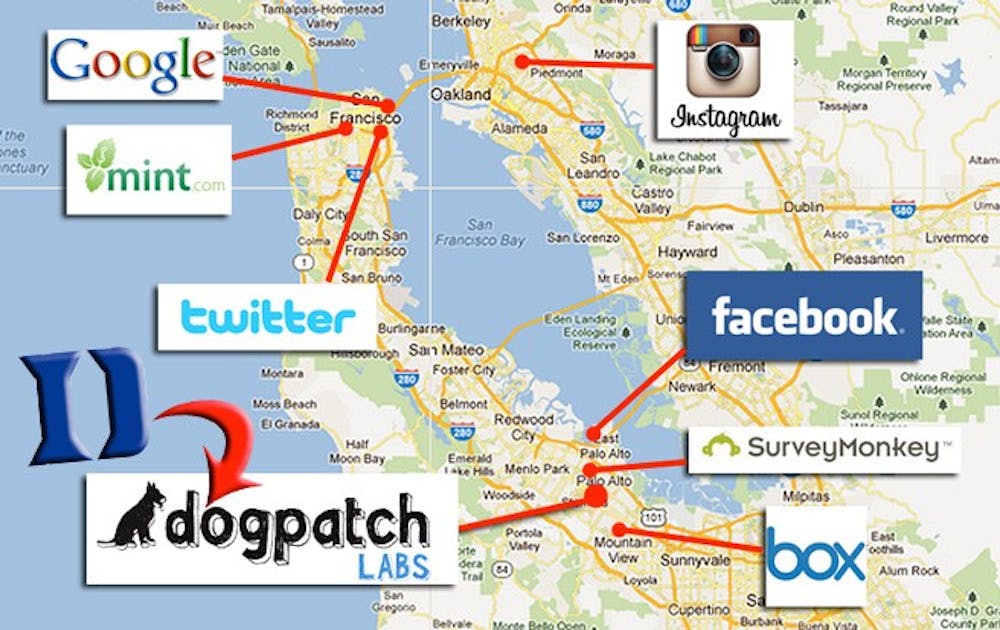Duke is extending its entrepreneurial arm to Silicon Valley with new opportunities for students, faculty and alumni.
Two pilot programs will begin this summer in the innovation hub of northern California. Students working to further their own entrepreneurial initiatives through the Duke Global Entrepreneurship Network Silicon Valley Incubator Program will work at Dogpatch Labs, an incubator space designed to connect entrepreneurs and launch startups. Other students will pursue internship opportunities at existing startup companies. The Global Education Office for Undergraduates will review a third pilot program for approval next week—a course on entrepreneurship that would be available to all undergraduates next Summer in Silicon Valley. “We want to give students a rich experience in some of the most robust, innovative ecosystems and help educate the next generation to be more entrepreneurial,” said Kimberly Jenkins, senior adviser to the president and provost for innovation and entrepreneurship.
Ryan Spoon, Trinity ’03 and a principal at Polaris Venture Partners, a startup investment firm that created Dogpatch labs, will mentor three Duke student startup programs this summer. Jason Freedman, Trinity ’02 and co-founder of 42Floors, an online office real estate database, will also assist the students as they pursue their entrepreneurial initiatives.
In addition, other students will intern at startup companies either founded by or connected to Duke alumni, Jenkins said. As a part of both programs, all participating Duke students and alumni will gather every Friday to foster collaboration.
Junior Fabio Berger—a founding member of the entrepreneurial selective living group InCube and co-founder of WealthLift.com, an investments education website tailored to young people—understands first-hand the importance of creating this kind of community.
“Entrepreneurship is very much a relationships business,” Berger said. “Who you know and how you know them is important, and age doesn’t really matter, so for students to go over there and already show them what they’re capable of is really powerful.”
Ten students will travel to Silicon Valley for Duke programs this summer, said Howie Rhee, managing director of the Center for Entrepreneurship and Innovation at the Fuqua School of Business and Fuqua ’04.
Jenkins said the initiatives were inspired by data that demonstrated a large concentration of alumni pursuing entrepreneurial opportunities in Silicon Valley. Students, faculty and alumni have expressed interest in developing more of a Duke presence there.
“Students want to mingle with venture capitalists and get advice from former Duke students who have started their own companies, and alumni [in Silicon Valley] want more of a connection to our students, faculty and other alums,” Jenkins added.
Senior Daniel Bingyou—vice president of sales at Hootli, a local discount distributor started by Duke students, and president of the Duke chapter of the Kairos Society—values the advice given to him from speaking with alumni in Silicon Valley on his own.
“They gave me some knowledge of hindsight without having to pay those consequences myself,” Bingyou said. “Now I can take certain steps to attempt to avoid some of those speed bumps.”
As a third leg of Duke’s entrepreneurial venture in Silicon Valley, the course “Building and Sustaining a Successful New Enterprise” will seek approval by the global education office next week, Jenkins said. Clayton Christensen, Kim B. Clark professor of business administration at Harvard Business School, plans to teach the course starting Summer 2013 with his son Matthew Christensen, Pratt School of Engineering ’02, who also played on the Duke basketball team during their 2001 national championship season. Matthew Christensen is currently the CEO of Rose Park Advisors, a firm founded by his father that focuses on identifying investment opportunities created by startup companies.
Jenkins said she is hopeful for the course’s approval. Modeled after a course on innovation and entrepreneurship at Harvard Business School, the four-week course will be open to all undergraduates through an application process. Such programs have existed at the Massachusetts Institute of Technology and Stanford University, but Duke is still a leading institution in entrepreneurship education, she said.
“There is a lot of synergy with the kinds of students that we admit and entrepreneurs, and many of the traits are very similar,” Jenkins said. “We’re looking for intellectually curious, passionate, sociable and often relentless and persistent students, and that’s what it takes to be a successful entrepreneur.”
The program’s long-term vision involves creating similar intern and incubator programs across the country, in cities like New York, Boston, Austin and Seattle, which are standouts in being highly innovative, Jenkins added. Eventually, programs may even be offered abroad.
“We need to pilot these programs, see what works and what doesn’t work, and then we’ll figure out the next step,” she said.
Get The Chronicle straight to your inbox
Signup for our weekly newsletter. Cancel at any time.

